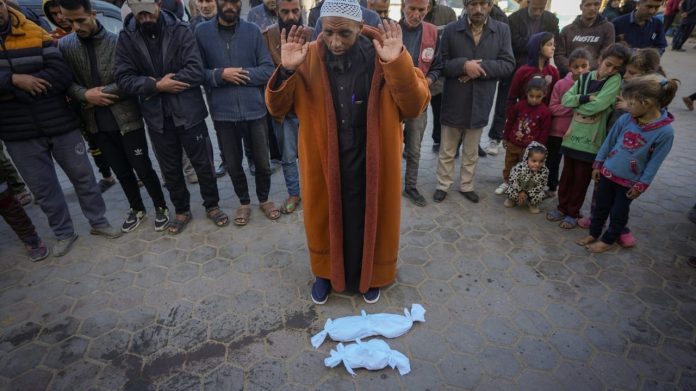– Yusra Firdaus
Gaza’s icy winter has turned tragic for its most vulnerable residents – babies and infants. With temperatures dropping to bone-chilling levels and families living in makeshift shelters, at least eight newborns have frozen to death in recent weeks. These deaths are more than statistics; they are the heartbreak of parents who’ve lost their children.
On December 30, a one-month-old baby, Ali al-Batran, took his last breath after succumbing to hypothermia. Just a day earlier, his twin brother had passed away. Their family, like thousands of others, is living in a displacement camp with nothing but thin fabric walls to protect them from the icy winds. The deaths of these babies are not isolated incidents. Six more infants have reportedly died under similar circumstances, as freezing temperatures claim lives one by one.
“Ali didn’t stand a chance,” said a relative, tears streaming down her face. “We wrapped him in every piece of cloth we had, but it wasn’t enough. How do you keep a baby warm in a tent when the wind is colder than your touch?”
Gaza’s hospitals, already overwhelmed by years of blockade and conflict, are struggling to cope. Medical staff work tirelessly but are hamstrung by power shortages and a lack of basic medical supplies.
The International Federation of Red Cross and Red Crescent Societies (IFRC) has raised alarm bells, calling for immediate, unhindered access to Gaza.
The UN has also issued an urgent appeal, emphasising that Gaza’s crisis is not just about politics or borders – it’s about the survival of human beings.
Parents in Gaza are doing everything they can, but the odds are stacked against them. Families crowd together under threadbare blankets, sharing body heat in a desperate attempt to keep their children alive. For those who have already lost loved ones, the grief is compounded by a deep sense of helplessness.
“We are trapped in a nightmare,” said Ahmed, a father of three who lives in a makeshift tent near Gaza. “Every night, I stay awake to check if my children are still breathing.”
Humanitarian organisations like UNICEF, the IFRC, and others are calling for global support to prevent further loss of life. But time is running out.




